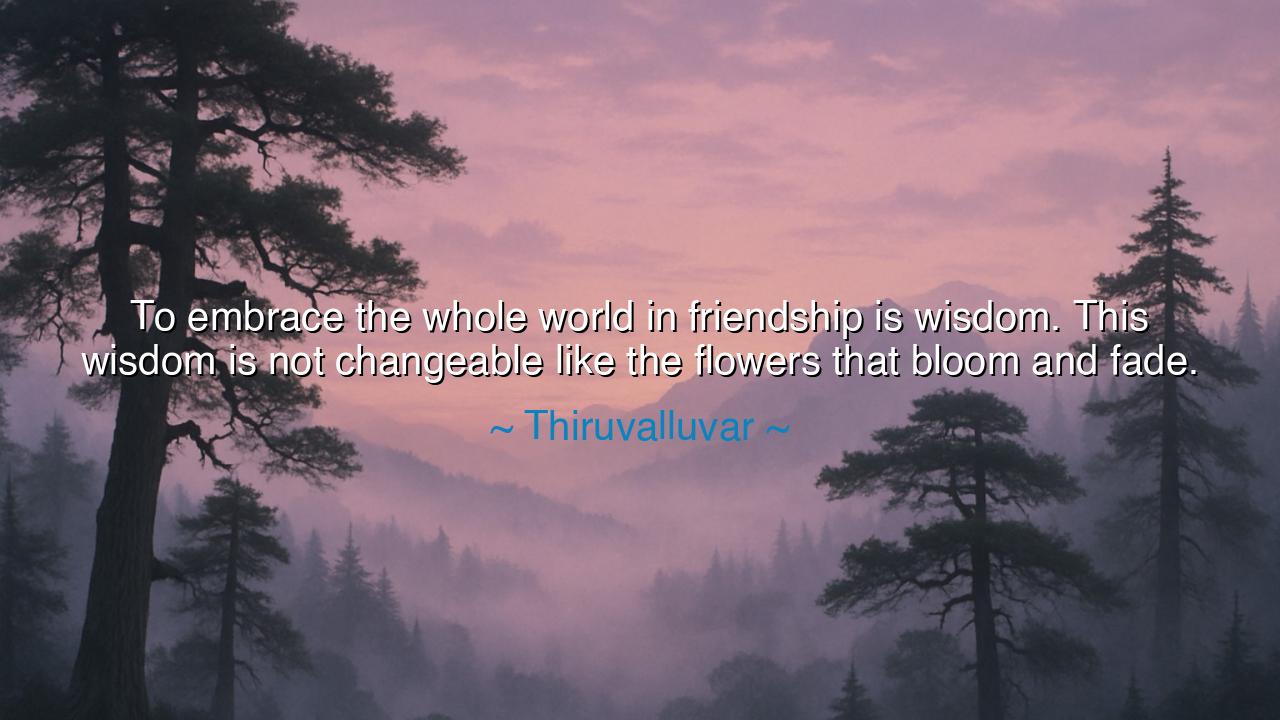
To embrace the whole world in friendship is wisdom. This wisdom
To embrace the whole world in friendship is wisdom. This wisdom is not changeable like the flowers that bloom and fade.






In the timeless words of Thiruvalluvar, the sage of Tamil wisdom and poet of universal truth, we find a teaching radiant as the morning sun: “To embrace the whole world in friendship is wisdom. This wisdom is not changeable like the flowers that bloom and fade.” These words, spoken over two thousand years ago in the sacred verses of the Thirukkural, reach across the centuries with undiminished power. They remind humanity that friendship, born of compassion and equality, is not a fleeting sentiment but the eternal mark of true understanding. For to love not only one’s kin or country, but to open the heart to all creation — this is not mere kindness, but wisdom, the highest expression of enlightenment.
The origin of this quote lies in the Thirukkural, one of the oldest and most revered works of moral and philosophical literature in the world. Written by Thiruvalluvar, the saint-poet of ancient Tamil Nadu, the Thirukkural consists of 1,330 couplets, each a jewel of ethics and virtue. It speaks of righteousness, wealth, and love — not as abstract ideals, but as the foundations of harmonious living. In this particular verse, Thiruvalluvar speaks of friendship that transcends boundaries, a friendship rooted in the realization that all beings are connected by the same divine essence. This, he teaches, is not the shallow affection that waxes and wanes like flowers in the wind, but the unchanging wisdom of a heart at peace with the world.
To “embrace the whole world in friendship” is to see oneself not as separate, but as part of a vast and living whole. The wise man does not reserve his goodwill for his neighbors alone, nor does he divide humanity into friend and foe. His love flows like a river that nourishes all it touches, asking nothing in return. The flowers that bloom and fade are symbols of emotions that rise and fall with circumstance — the love that exists only when convenient, the friendship that thrives only when praised. But true wisdom, says Thiruvalluvar, is steadfast. It is like the mountain that stands unmoved by storms, or the lamp that shines even when surrounded by darkness.
Consider the life of Emperor Ashoka, once a conqueror whose ambition brought rivers of blood across the land. After the terrible war of Kalinga, he stood among the dead and realized the emptiness of victory. From that moment, he laid down his sword and embraced friendship with all living beings. He sent envoys not of war, but of peace, to distant kingdoms. He built hospitals for humans and animals alike, engraved words of compassion on stone pillars, and declared that all faiths were worthy of respect. In that transformation, we see Thiruvalluvar’s teaching made flesh: Ashoka’s heart became vast as the sky, and his wisdom no longer bloomed and faded with the seasons — it endured like truth itself.
Thiruvalluvar’s wisdom is both tender and mighty. He knew that to love universally is not weakness, but strength of the highest kind. It takes courage to forgive, to understand, and to see beyond the narrow borders of self-interest. The world, driven by desire and division, often mistakes cruelty for power and indifference for intellect. Yet Thiruvalluvar calls us to a higher standard — to a friendship that mirrors the eternal, unbroken by time, untouched by hatred. This kind of friendship does not depend on what others are, but on what we choose to be: compassionate, patient, and wise.
The sage’s comparison to flowers is as beautiful as it is profound. Flowers bloom brightly, delighting the senses, yet their beauty is short-lived; they wither with the setting sun. Likewise, emotions untethered to wisdom are brief and fickle. But the friendship of the wise endures beyond circumstance, because it is founded not on emotion alone, but on understanding. It does not seek reward or recognition; it is love in its purest form — love that gives freely, that sees itself in all beings. Such love is the fragrance of virtue that never fades, the flower that does not die.
So, my child, remember this teaching of Thiruvalluvar, which is older than kingdoms and deeper than oceans. Do not let your heart become small, clinging only to those who think as you do or speak your tongue. Cultivate friendship with all — the poor and the rich, the stranger and the friend, the living and even the silent earth beneath your feet. For when you embrace the world with goodwill, you are no longer a fragment; you become whole. And that wholeness is wisdom.
Let your friendship be like the light of the sun — impartial, constant, and giving life to all. Seek not fleeting flowers of affection, but the enduring tree of compassion that grows in the heart of the wise. For as Thiruvalluvar teaches, only when one’s love expands to embrace the world does one truly know the meaning of wisdom — a wisdom unchanging, eternal, and radiant as the divine itself.






AAdministratorAdministrator
Welcome, honored guests. Please leave a comment, we will respond soon